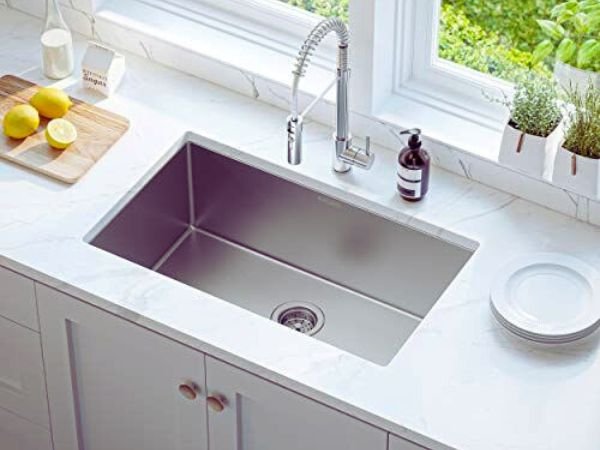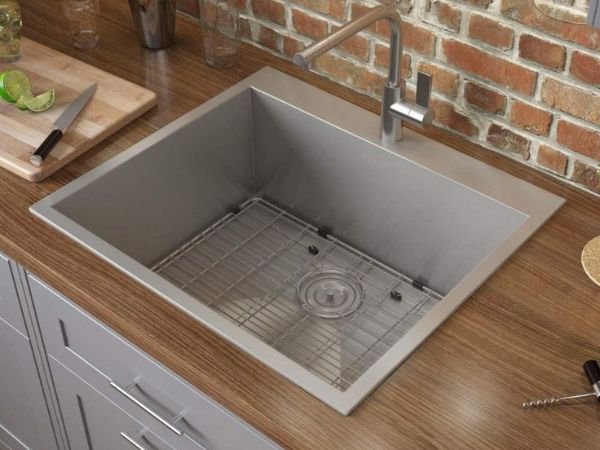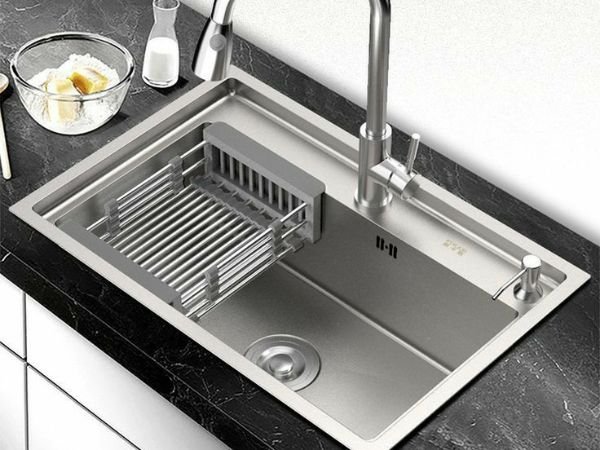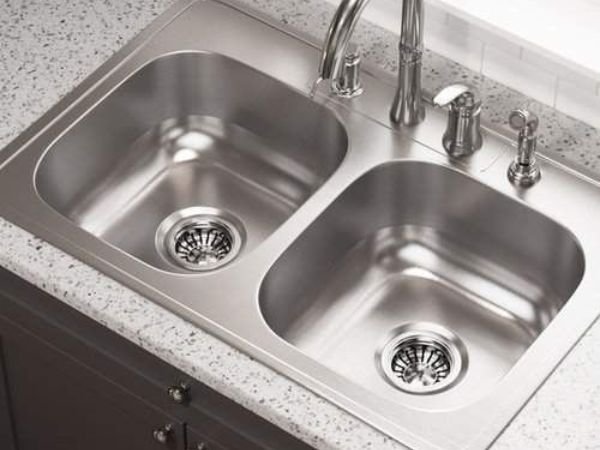Physical Address
Jashpur (C.G.)
496220
The best gauge for a stainless steel sink depends on various factors such as durability, noise reduction, and cost.

When it comes to choosing a stainless steel sink, one important factor to consider is the gauge. The gauge refers to the thickness of the stainless steel material used to construct the sink. Different gauge options are available, each with its own pros and cons. Understanding these options can help you make an informed decision and choose the best gauge for your stainless steel sink.
18 guage sink
One of the most common gauge options for stainless steel sinks is 18 gauge. This gauge is considered a good balance between durability and cost. It offers a sturdy construction that can withstand daily use and is less prone to denting or scratching. Additionally, 18 gauge sinks tend to have a quieter operation, as the thicker material helps to dampen noise. However, one drawback of 18 gauge sinks is that they may be more susceptible to water spots and stains, as the thinner material can be more prone to corrosion.

16 guage sink
If you are looking for a more heavy-duty option, you may consider a 16 gauge stainless steel sink. This gauge is thicker and therefore offers increased durability and resistance to dents and scratches. 16 gauge sinks are often chosen for high-traffic areas or commercial settings where the sink will be subjected to heavy use. Additionally, the thicker material of 16 gauge sinks provides better insulation, reducing noise and heat transfer. However, it is important to note that 16 gauge sinks are generally more expensive than their 18 gauge counterparts.

20 guage sink
On the other end of the spectrum, there are also lighter gauge options available for stainless steel sinks. 20 gauge sinks, for example, are thinner and more affordable. They are often chosen for less frequently used areas, such as a secondary kitchen sink or a bar sink. While 20 gauge sinks may be more prone to denting and scratching, they can still offer adequate durability for light use. It is important to consider your specific needs and usage patterns when deciding on a lighter gauge sink.

Aside from the gauge, it is important to take into account the stainless steel sink’s finish. A brushed finish, for instance, can effectively conceal scratches and water spots, making it a favored option for areas with heavy foot traffic. Conversely, a polished finish provides a stylish and contemporary appearance, although it may demand more upkeep to maintain its pristine look.
In conclusion, the gauge of a stainless steel sink is an important factor to consider when making a purchase. The gauge determines the thickness of the sink and can impact its durability, resistance to dents and scratches, noise level, and cost. 18 gauge sinks offer a good balance between durability and cost, while 16 gauge sinks provide increased durability and insulation but at a higher price point.
Stainless steel sinks are a popular choice for kitchens due to their durability, sleek appearance, and resistance to stains and corrosion. However, when it comes to choosing the right gauge for a stainless steel sink, there are several factors to consider.

On the other hand, if you have a traditional or farmhouse-style kitchen with a more rustic and charming aesthetic, a higher gauge sink may be more suitable. The thinner gauge will give the sink a more delicate and refined look that matches the overall style of the kitchen.
When it comes to choosing a stainless steel sink, one of the most important factors to consider is the gauge. The gauge refers to the thickness of the stainless steel material used to construct the sink. It is measured in numbers, with a lower gauge indicating a thicker material. But what is the best gauge for a stainless steel sink? Let’s compare the durability and longevity of various gauge options to find out.
More durable
16 guage: Starting with the thickest gauge, 16 gauge stainless steel sinks are known for their exceptional durability. They are heavy-duty and can withstand heavy use without denting or scratching easily. These sinks are perfect for busy kitchens or commercial settings where the sink is subjected to constant use and abuse. However, they can be more expensive compared to sinks with a higher gauge.
Widely used
18 guage: Moving on to 18 gauge stainless steel sinks, these are the most common and widely used options. They strike a balance between durability and affordability, making them a popular choice for residential kitchens. While they may not be as thick as 16 gauge sinks, they still offer good resistance to dents and scratches. With proper care and maintenance, an 18 gauge sink can last for many years.
If you have tight budget
19 guage: Next, we have 20 gauge stainless steel sinks. These sinks are thinner and lighter compared to the previous options. While they may not be as durable as 16 or 18 gauge sinks, they can still serve their purpose well in a less demanding kitchen. If you don’t use your sink heavily or are on a tight budget, a 20 gauge sink can be a suitable choice. However, it’s important to note that they may be more prone to denting and scratching.
Suitable for rental property
22 guage: Finally, we have 22 gauge stainless steel sinks, which are the thinnest and lightest options available. These sinks are often used in situations where cost is the primary concern, such as rental properties or temporary setups. While they may not offer the same level of durability as thicker gauge sinks, they can still be functional if handled with care. However, it’s worth mentioning that they may be more susceptible to denting and scratching, and their lifespan may be shorter compared to thicker gauge sinks.
In conclusion, the best gauge for a stainless steel sink depends on your specific needs and budget. If durability is your top priority and you can afford it, a 16 or 18 gauge sink would be the ideal choice. However, if you’re looking for a more affordable option or don’t use your sink heavily, a 20 or 22 gauge sink can still serve you well. Ultimately, it’s important to consider your usage patterns, budget, and desired lifespan when making a decision.
The gauge of a stainless steel sink not only affects its durability but also its appearance and style. A thicker gauge sink tends to have a more substantial and solid look, while a thinner gauge sink may appear more delicate and sleek. The choice of gauge can greatly impact the overall aesthetic of your kitchen.

Looking for stylish go for thinner
If you prefer a modern and minimalist look, a thinner gauge sink may be the way to go. These sinks often have a sleek and streamlined appearance that can complement contemporary kitchen designs. However, it is important to note that thinner gauge sinks may be more prone to dents and scratches, so extra care must be taken to maintain their appearance.
solid and traditional look go for thicker
On the other hand, if you prefer a more traditional or industrial look, a thicker gauge sink may be more suitable. These sinks have a robust and sturdy appearance that can add a touch of elegance to your kitchen. Thicker gauge sinks are also more resistant to dents and scratches, making them a practical choice for busy kitchens.
In addition to appearance, the gauge of a stainless steel sink can also affect its functionality. Thicker gauge sinks tend to be more resistant to noise and vibrations, making them quieter when water is running or dishes are being washed. This can be particularly beneficial if you have an open-concept kitchen or if noise is a concern for you.
Thicker guage more heat absorber
Furthermore, the gauge of a stainless steel sink can also impact its ability to retain heat. Thicker gauge sinks tend to retain heat better, which can be advantageous when washing dishes or preparing food. This can help to conserve energy and make your kitchen tasks more efficient.
When choosing the gauge for your stainless steel sink, it is important to consider your specific needs and preferences. If you have a busy household or tend to be rough on your kitchen sink, a thicker gauge sink may be a better choice to ensure durability and longevity. However, if you prioritize style and have a more delicate touch, a thinner gauge sink may be more suitable.
It is important to have a good understanding of the price and worth of different gauge options for stainless steel sinks in order to make an informed choice. The gauge of a stainless steel sink not only impacts its cost but also influences how well it performs and how long it lasts. Let’s explore the different gauge choices and their advantages and disadvantages.
Dont use 18 guage if you have a busy kitchen
The most common gauges for stainless steel sinks are 18, 16, and 14. An 18-gauge sink is the thinnest and least expensive option. While it may be more affordable, it is also more prone to dents and scratches. If you have a busy kitchen or use your sink frequently, an 18-gauge sink may not be the best choice as it may not withstand heavy use over time.
16 guage for heavy duty kitchen
A step up from the 18-gauge sink is the 16-gauge sink. This gauge is thicker and more durable, making it a popular choice for homeowners who want a balance between cost and quality. A 16-gauge sink is less likely to dent or scratch, making it suitable for kitchens with heavy use. However, it is important to note that a 16-gauge sink will be more expensive than an 18-gauge sink.
Quality guage
For those seeking the highest quality and durability, a 14-gauge sink is the way to go. This gauge is the thickest and most robust option available. A 14-gauge sink can withstand heavy use, resist dents and scratches, and provide a long-lasting investment for your kitchen. However, it is important to consider that a 14-gauge sink will come with a higher price tag.
When deciding on the best gauge for your stainless steel sink, it is essential to consider your budget, kitchen usage, and personal preferences. While a thicker gauge may offer better durability, it may not be necessary for every kitchen. If you have a low-traffic kitchen or are on a tight budget, an 18-gauge sink may be sufficient for your needs.
On the other hand, if you have a bustling kitchen with frequent use, investing in a 16 or 14-gauge sink may be a wise decision. The added durability and resistance to dents and scratches will ensure that your sink remains in top condition for years to come.
Experts generally agree for the query ‘Best gauge for a stainless steel sink’ is a stainless steel sink depends on your specific needs and preferences. However, there are some general guidelines that can help you narrow down your options. For most residential kitchens, a gauge between 18 and 20 is recommended. This range strikes a balance between durability and cost-effectiveness.
A sink with a higher gauge, such as 22 or 24, is thinner and more prone to dents and scratches. While these sinks may be more affordable, they may not withstand heavy use or sharp utensils. On the other hand, a sink with a lower gauge, such as 16 or 14, is thicker and more durable. These sinks are ideal for commercial kitchens or households with heavy usage.
Thicker guages tend to be quiter
Another factor to consider when choosing the gauge for your stainless steel sink is the noise level. Thicker gauges tend to be quieter as they absorb more sound. If you value a quiet kitchen environment, you may want to opt for a sink with a lower gauge. However, it is worth noting that modern sink designs and soundproofing technologies have significantly reduced noise levels in stainless steel sinks overall.
304-grade stainless steel
In addition to gauge, the quality of the stainless steel used in the sink is also crucial. Look for sinks made from 304-grade stainless steel, as it is highly resistant to corrosion and staining. This grade of stainless steel is also easy to clean and maintain, making it a popular choice among homeowners and professionals alike.
When it comes to aesthetics, the gauge of the sink can also play a role. Thicker gauges tend to have a more substantial and luxurious appearance, while thinner gauges can give a sleek and modern look. Consider the overall style of your kitchen and choose a gauge that complements your design preferences.
In conclusion, the gauge of a stainless steel sink is an important consideration when making a purchase. The recommended gauge for most residential kitchens falls between 18 and 20, striking a balance between durability and cost-effectiveness. Thicker gauges offer increased durability and reduced noise levels, making them suitable for heavy usage or commercial kitchens. However, thinner gauges can provide a sleek and modern aesthetic
1. What is the best gauge for a stainless steel sink?
The best gauge for a stainless steel sink is typically between 16 and 18 gauge.
2. Why is a 16-18 gauge recommended for stainless steel sinks?
A 16-18 gauge stainless steel sink offers a good balance of durability, strength, and cost-effectiveness.
3. What happens if the gauge is too thin for a stainless steel sink?
If the gauge is too thin, the sink may be more prone to denting, warping, and noise when in use.
4. Can a thicker gauge be used for a stainless steel sink?
Yes, a thicker gauge such as 14 or 12 can be used for added durability, but it may come at a higher cost.
5. Are there any disadvantages to using a thicker gauge for a stainless steel sink?
Using a thicker gauge may increase the weight of the sink, potentially requiring additional support during installation.
6. Is the gauge the only factor to consider when choosing a stainless steel sink?
No, other factors such as sink size, depth, finish, and design should also be considered when choosing a stainless steel sink.
The best gauge for a stainless steel sink depends on personal preference and usage requirements. Thicker gauges, such as 16 or 18, offer more durability and resistance to dents and scratches. However, thinner gauges, like 22 or 24, can be more cost-effective and suitable for lighter use. Ultimately, the choice of gauge should be based on the specific needs and budget of the individual.
The gauge of a stainless steel sink refers to its thickness. Both 18 and 20 gauge stainless steel sinks are commonly used and have their own advantages. 18 gauge sinks are thicker and offer more durability and resilience to dents and scratches. On the other hand, 20 gauge sinks are lighter and less expensive. The choice between the two depends on your personal preference and budget.
In terms of strength, 16 gauge stainless steel is stronger than 18 gauge. The lower the gauge number, the thicker the stainless steel. Therefore, 16 gauge sinks are more resistant to dents and damages compared to 18 gauge sinks.
When comparing 14 and 16 gauge stainless steel, 14 gauge is thicker and stronger than 16 gauge. It offers better durability, resistance to dents, and longer lifespan. However, 16 gauge sinks are still considered to be of good quality and are commonly used in households.
Description for this block. Use this space for describing your block. Any text will do. Description for this block. You can use this space for describing your block.
While 20-gauge steel is commonly used for kitchen sinks, it is generally considered to be thinner and less durable compared to sinks made from 16 or 18-gauge steel.
An 18 gauge sink is generally considered to be a good choice for a kitchen sink. It is thicker and more durable than 20 gauge sinks, providing better resistance to dents and scratches.
The best kitchen sink ultimately depends on personal preferences and needs. However, some factors to consider include the material (stainless steel, cast iron, composite granite, etc.), gauge (thicker gauges are generally more durable), size, style, and features such as extra-deep basins or double bowls. It is recommended to research and compare different options before making a final decision.